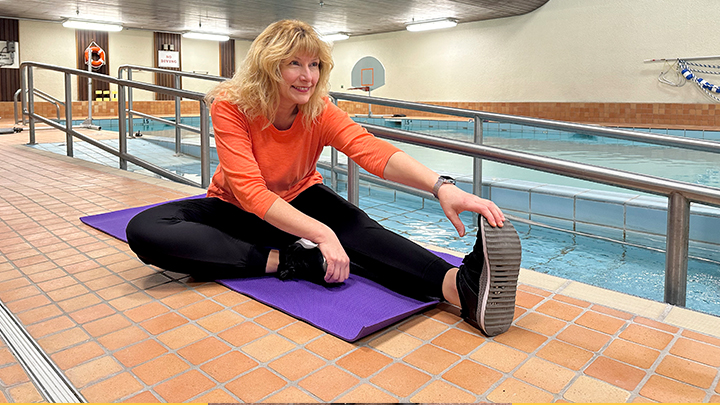
February 23, 2024

Recreation Therapist Terry Neumann stretches poolside at Alberta Hospital Edmonton. Swimming is just one of many recreational activities offered to patients. Photo by Chelsea Blair.
Story & photo by Chelsea Blair
EDMONTON — It’s early morning, and even though she’s tired, Hope starts her day by exercising in the gym at Alberta Hospital Edmonton (AHE), where she’s a patient.
“I go to gym every day and I feel better after. It really helps,” says Hope, whose last name is being withheld for privacy.
Workout sessions are just one of the many activities offered in the recreation therapy program. Patients can also join in yoga, meditation, sports, swimming, games, gardening, arts and crafts, community outings and walks throughout the hospital’s scenic 160-acre grounds.
“We do a lot of fun things that are inherently therapeutic,” says Terry Neumann, a Recreation Therapist at AHE for three decades. While leisure and recreation help patients improve their physical, mental and emotional well-being, she believes the heart of the program is about empowering patients to be their best selves.
The recreation therapy team constantly evaluates programming by building off new research and patients’ feedback.
“Patients play an active role in their treatment here,” says Neumann. “There’s also a strong focus on collaboration with other allied health professionals including occupational therapists. It’s a community here, and we want everyone to thrive and be successful.”
But it’s not a one-size-fits-all approach. “People come to the hospital with a variety of diagnoses, and we have to be very creative and very inclusive with our programming” she adds.
Through a variety of programming, patients get to explore their interests and gain valuable communication, social and coping skills. With the help of occupational therapists and dietitians, patients also learn life skills such as budgeting and eating a balanced diet.
Through community outings, patients become familiar with community resources and services including libraries, fitness centres, art programs and day programs, which helps them build a support network for when they’re ready to leave the hospital.
Amy Delday, Clinical Lead for recreation therapy at AHE, says that when it comes to mental illness, “we’ve moved away from the idea that the illness is at the centre of the person. We try and look at the individual holistically and focus on their strengths, not their weaknesses.”
For Delday, Neumann and their colleagues, recreation therapy plays an important part in guiding people on their journey of recovery — and inspiring them to achieve true progress and healing.
“If you’re doing things during the day and you’re with people,” says Hope, “it really helps, and everyone needs help sometimes.”